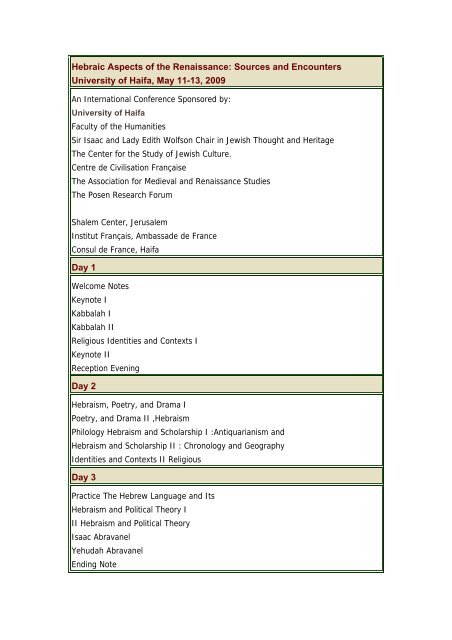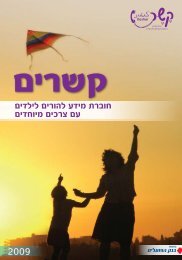Hebraic Aspects of the Renaissance: Sources and ... - Haifa
Hebraic Aspects of the Renaissance: Sources and ... - Haifa
Hebraic Aspects of the Renaissance: Sources and ... - Haifa
Create successful ePaper yourself
Turn your PDF publications into a flip-book with our unique Google optimized e-Paper software.
<strong>Hebraic</strong> <strong>Aspects</strong> <strong>of</strong> <strong>the</strong> <strong>Renaissance</strong>: <strong>Sources</strong> <strong>and</strong> Encounters<br />
University <strong>of</strong> <strong>Haifa</strong>, May 11-13, 2009<br />
An International Conference Sponsored by:<br />
University <strong>of</strong> <strong>Haifa</strong><br />
Faculty <strong>of</strong> <strong>the</strong> Humanities<br />
Sir Isaac <strong>and</strong> Lady Edith Wolfson Chair in Jewish Thought <strong>and</strong> Heritage<br />
The Center for <strong>the</strong> Study <strong>of</strong> Jewish Culture.<br />
Centre de Civilisation Française<br />
The Association for Medieval <strong>and</strong> <strong>Renaissance</strong> Studies<br />
The Posen Research Forum<br />
Shalem Center, Jerusalem<br />
Institut Français, Ambassade de France<br />
Consul de France, <strong>Haifa</strong><br />
Day 1<br />
Welcome Notes<br />
Keynote I<br />
Kabbalah I<br />
Kabbalah II<br />
Religious Identities <strong>and</strong> Contexts I<br />
Keynote II<br />
Reception Evening<br />
Day 2<br />
Hebraism, Poetry, <strong>and</strong> Drama I<br />
Poetry, <strong>and</strong> Drama II , Hebraism<br />
Philology Hebraism <strong>and</strong> Scholarship I :Antiquarianism <strong>and</strong><br />
Hebraism <strong>and</strong> Scholarship II : Chronology <strong>and</strong> Geography<br />
Identities <strong>and</strong> Contexts II Religious<br />
Day 3<br />
Practice The Hebrew Language <strong>and</strong> Its<br />
Hebraism <strong>and</strong> Political Theory I<br />
II Hebraism <strong>and</strong> Political Theory<br />
Isaac Abravanel<br />
Yehudah Abravanel<br />
Ending Note
Day 1, May 11, 2009<br />
8:30-9:00<br />
Registration <strong>and</strong> ga<strong>the</strong>ring, c<strong>of</strong>fee<br />
9:00-9:45<br />
Welcome notes<br />
Chair: Ilana Zinguer<br />
Ambassadeur de France / Attaché Culturel<br />
Dean / Rector<br />
Ilana Zinguer (Centre de recherche de Civilisation Fran?aise)<br />
9:45-10:45<br />
Keynote I<br />
Chair: Ilana Zinguer<br />
Georges Molinié (Président, Sorbonne, Paris IV)<br />
Postures et images juives par rapport à la culture baroque<br />
Pause-------------------------<br />
11:00-12:30<br />
Kabbalah I<br />
Chair: Bernard Cooperman<br />
Lina Bolzoni (Scuola Normale di Pisa)<br />
Giulio Camillo’s Memory Theatre <strong>and</strong> <strong>the</strong> Kabbalah<br />
Roni Weinstein (University <strong>of</strong> Pisa)<br />
Sixteenth-Century Jewish Mysticism as a Catholic Baroque Phenomenon<br />
Yossi Chajes (University <strong>of</strong> <strong>Haifa</strong>)<br />
It's Good to See <strong>the</strong> King : Toward an Historical Anthropology <strong>of</strong> Early Modern<br />
Jewish Cosmological Cartography<br />
12:30<br />
Lunch break<br />
14:00-15:30<br />
Kabbalah II<br />
Chair: Lina Bolzoni<br />
Bernard Cooperman (University <strong>of</strong> Maryl<strong>and</strong>)<br />
Kabbalistic Enthusiasms <strong>of</strong> a Rabbi for Hire. The Sermons <strong>of</strong> Isaac di Lattes<br />
Sheila Rabin (St. Peter's College)
Pico, Astrology, <strong>and</strong> Kabbalah<br />
Dvora Bregman (Ben Gurion University)<br />
Notes on <strong>the</strong> Poetry <strong>of</strong> Moses Zacuto<br />
Pause-------------------------<br />
15:45-17:30<br />
Religious Identities <strong>and</strong> Contexts I<br />
Chair: Frank Lestringuant (Paris Sorbonne)<br />
Ilana Zinguer (University <strong>of</strong> <strong>Haifa</strong>)<br />
L'implicite à propos des Juifs de Rome (Journal de Voyage, Montaigne)<br />
Annie Molinié (Sorbonne, Paris IV) <strong>and</strong><br />
Béatrice Perez (Université de Rennes)<br />
Les premiers jésuites d'origine "conversa" (deuxième moitié du XVIe siècle): Diego<br />
Lainez, Polanco et les autres<br />
Giuseppe Veltri (University <strong>of</strong> Halle)<br />
Defining Jewish “Rituals” in <strong>the</strong> Early Modern Period: History <strong>of</strong> a Philosophical-<br />
Political Concept<br />
17:30-18:00<br />
C<strong>of</strong>fee break-------------------------<br />
18:00-19:00<br />
Keynote II<br />
Chair: Abraham Melamed<br />
Joanna Weinberg (Oxford University)<br />
Jewish Wisdom <strong>and</strong> <strong>the</strong> Limits <strong>of</strong> Christian Hebraism<br />
20:00<br />
Reception (Consul de France, <strong>Haifa</strong>)<br />
Frank Lestringant (Sorbonne, Paris IV)<br />
Kabbale et cosmographie, de Guillaume Postel à Jacques d'Auzoles-Lapeyre<br />
May 12, 2009 , Day 2<br />
8:30-9:00<br />
Ga<strong>the</strong>ring, c<strong>of</strong>fee<br />
9:00-10:30<br />
Hebraism, Poetry, <strong>and</strong> Drama I<br />
Chair : Ofir Haivry (The Shalem Center)
Lauren Silberman (CUNY)<br />
Aaron, The Bro<strong>the</strong>r Who Proves <strong>the</strong> Rule: Typological Negotiations in Titus<br />
Andronicus<br />
Konrad Eisenbichler (University <strong>of</strong> Toronto)<br />
Ancient Israel in <strong>the</strong> Religious Theatre <strong>of</strong> <strong>Renaissance</strong> Italy<br />
Nancy Rosenfeld (University <strong>of</strong> <strong>Haifa</strong>)<br />
'The Law <strong>of</strong> Moses as well as <strong>the</strong> Devil, Death, <strong>and</strong> Hell': John Bunyan <strong>and</strong><br />
Christian Kabbalah<br />
Pause-------------------------<br />
10:45-12:45<br />
Hebraism, Poetry, <strong>and</strong> Drama II<br />
Chair: Dvora Bregman (Ben Gurion University)<br />
Elliott Simon (University <strong>of</strong> <strong>Haifa</strong>)<br />
From Maimonides to Sir Philip Sidney: The Poet’s Prophetic Voice<br />
Chanita Goodblatt (Ben Gurion University )<br />
"Thy Firmness makes my Circles Just/And makes me end, where I begunne":<br />
Abraham Ibn Ezra <strong>and</strong> John Donne as Poet-Exegetes<br />
Noam Flinker (University <strong>of</strong> <strong>Haifa</strong>)<br />
“Free as <strong>the</strong> Road”: George Herbert’s <strong>Hebraic</strong> Texts<br />
Philip Ford (Cambridge University)<br />
The Place <strong>of</strong> Hebrew Poetry in <strong>the</strong> Teaching <strong>of</strong> Charles Utenhove<br />
12:45<br />
Lunch break-------------------------<br />
14:15-15:45<br />
Hebraism <strong>and</strong> Scholarship I: Antiquarianism <strong>and</strong> Philology<br />
Chair : Philip Ford (Cambridge University)<br />
Arthur Eyffinger (Huygens Institute)<br />
Biblical Philology at Leiden University<br />
Daniel Stein-Kokin (Yale University)<br />
Egidio da Viterbo <strong>and</strong> Christian Hebraism in High <strong>Renaissance</strong> Rome.<br />
Jonathan Elukin (Trinity College Hartford)<br />
The Urim <strong>and</strong> Thumim <strong>and</strong> Christian Hebraism<br />
Pause-------------------------
16:00-17:30<br />
Hebraism <strong>and</strong> Scholarship II: Chronology <strong>and</strong> Geography<br />
Chair : Jonathan Elukin (Trinity College Hartford)<br />
Avner Ben Zaken (Harvard Society <strong>of</strong> Fellows)<br />
Hebraist Motives, Pythagorean Itineraries, <strong>and</strong> <strong>the</strong> Galilean Agendas <strong>of</strong> Naples: On<br />
<strong>the</strong> Margins <strong>of</strong> Text <strong>and</strong> Context<br />
Zur Shalev ( University <strong>of</strong> <strong>Haifa</strong>)<br />
Benjamin <strong>of</strong> Tudela, Spanish Discoverer<br />
Fabrizio Lelli (University <strong>of</strong> Lecce)<br />
The Role <strong>of</strong> Early <strong>Renaissance</strong> Geographical Discoveries in Yohanan Alemanno’s<br />
Messianic Thought<br />
17:30-18:00<br />
C<strong>of</strong>fee break-------------------------<br />
18:00-19:15<br />
Religious Identities <strong>and</strong> Contexts II<br />
Chair: Myriam Yardeni (University <strong>of</strong> <strong>Haifa</strong>)<br />
Sina Rauschenbach (University <strong>of</strong> Halle)<br />
Dealing with Jewish Knowledge: Menasseh Ben Israel <strong>and</strong> <strong>the</strong> Christian Respublica<br />
Litteraria<br />
Aless<strong>and</strong>ro Guetta (INALCO – Paris)<br />
The Debate on <strong>the</strong> Immortality <strong>of</strong> <strong>the</strong> soul in Early Modern Italy:<br />
a symptom <strong>of</strong> closer Jewish-Christian dialogue?<br />
Day 3, May 13, 2009<br />
8:30-9:00<br />
Ga<strong>the</strong>ring, c<strong>of</strong>fee<br />
9:00-10:45<br />
The Hebrew Language <strong>and</strong> Its Practice<br />
Chair: Noam Flinker (University <strong>of</strong> <strong>Haifa</strong>)<br />
Arthur Lesley (Baltimore Hebrew College)<br />
Yohanan Alemanno's Formulation <strong>of</strong> Hebrew Rhetorical Practice.<br />
Kenneth Stow (University <strong>of</strong> <strong>Haifa</strong>)<br />
Negotiating Self-Governance: Hebrew in <strong>the</strong> Service <strong>of</strong> Running <strong>the</strong> Jewish<br />
Universit?.<br />
Yaacov Deutsch (Hebrew University <strong>and</strong> Center for Jewish Studies at Harvard<br />
University)
Converting <strong>the</strong> New Testament: Hebrew Translations <strong>of</strong> <strong>the</strong> New Testament in <strong>the</strong><br />
Early Modern Period<br />
Pause-------------------------<br />
11:00-12:30<br />
Hebraism <strong>and</strong> Political Theory I<br />
Chair: Arthur Eyffinger (Huygens Institute)<br />
Lea Campos Boralevi (University <strong>of</strong> Florence)<br />
The Rise <strong>and</strong> Fall <strong>of</strong> <strong>the</strong> Respublica Hebraeorum as a Political Model in Early<br />
Modern Europe<br />
Meirav Jones (The Shalem Center)<br />
Philo Judaeus <strong>and</strong> Jewish Harmony in Grotius’ Laws <strong>of</strong> War <strong>and</strong> Peace<br />
Yitzhak Lifshitz (The Shalem Center)<br />
The Revival <strong>of</strong> <strong>the</strong> ideas <strong>of</strong> Medieval Ashkenaz in <strong>the</strong> 15th Century Political Thought<br />
<strong>of</strong> R. Yisrael Iserlin<br />
12:30<br />
Lunch break<br />
14:00-15:00<br />
Hebraism <strong>and</strong> Political Theory II<br />
Chair: Zur Shalev (University <strong>of</strong> <strong>Haifa</strong>)<br />
Ofir Haivry (The Shalem Center)<br />
Jewish <strong>Sources</strong> <strong>of</strong> John Selden’s Idea <strong>of</strong> Church-State Relations<br />
Fania Oz-Salzberger (University <strong>of</strong> <strong>Haifa</strong>)<br />
The social reading <strong>of</strong> <strong>the</strong> Bible by English thinkers <strong>of</strong> <strong>the</strong> mid 17th century<br />
C<strong>of</strong>fee break-------------------------<br />
15:15-16:45<br />
Isaac Abravanel<br />
Chair : Arthur Lesley<br />
Cedric Cohen Skalli (Tel Aviv University)<br />
Isaac <strong>and</strong> Yehudah Abravanel on Genesis: A Case <strong>of</strong> Jewish Reception <strong>of</strong> Florentine<br />
Platonism<br />
Vasileios Syros (University <strong>of</strong> Helsinki)<br />
The Political Function <strong>of</strong> Rhetoric in Don Isaac Abravanel’s Political Thought<br />
Abraham Melamed (University <strong>of</strong> <strong>Haifa</strong>)<br />
The Reception <strong>of</strong> Abravanel in Early Modern Political Thought<br />
16:45-17:15<br />
C<strong>of</strong>fee break-------------------------<br />
17:15-18:15
Yehudah Abravanel<br />
Chair : Georges Molinié (Sorbonne, Paris IV)<br />
Tristan Dagron (CNRS-Paris)<br />
Giordano Bruno, lecteur des Dialoghi d’amore de Leone Ebreo<br />
James W. Nelson Novoa (Villanova University)<br />
Leone Ebreo’s Diologhi d’amore as a Pivotal Document <strong>of</strong> Judeo-Christian Relations<br />
in <strong>Renaissance</strong> Rome<br />
18:15-17:00<br />
Ending Note<br />
David Baum (West Texas State A&M University)<br />
Anti-Semitism, Race <strong>and</strong> <strong>the</strong> <strong>Renaissance</strong> in Fascist Italy




